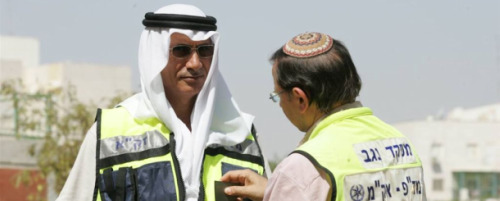Clearing up in the wake of a tragedy is not easy but in southern Israel it has led to cooperation and coexistence between two unlikely populations – the Bedouin and ultra-orthodox Jews.

It has become a familiar addition to the Israeli landscape – ultra-orthodox Jews wearing bright yellow reflective vests driving on motorcycles to the scene of an accident or a terrorist attack. They are the men of ZAKA, the volunteer organization that takes care of human remains after a disaster occurs.
It’s a daunting task, but a necessary one according to Jewish religious law (Halacha), which states that any human remains that can possibly be gathered must undergo a ritual Jewish burial.
While the ultra-orthodox community has a religious reason to take up the burden shouldered by ZAKA, they’ve found some unlikely brothers in arms in the Negev – where 10 members of the region’s Bedouin community, which suffers a considerable number of deaths each year caused by traffic accidents, have recently completed training to become full-fledged ZAKA volunteers.
The non-profit ZAKA – full name: Identification and Rescue – True Kindness – assists ambulance crews, aids in the identification of the victims of terrorism, road accidents and other disasters, and, where necessary, gathers body parts and spilled blood for burial. The organization also provides first aid and rescue services and helps to search for missing persons. Following terrorist acts, ZAKA volunteers also collect the bodies and body parts of non-Jews, including suicide bombers, for return to their families.
Founded in the early 1990s by the charismatic Yehuda Meshi Zahav and Rabbi Moshe Aizenbach, ZAKA has helped forensic teams in the US, Thailand, Sri Lanka, India and Indonesia in the wake of natural disasters, and its representatives flew to Mumbai, India following last year’s mass terrorist attack. ZAKA volunteers, whose numbers have swelled to more than a thousand, have been nicknamed “the team that sleeps with the dead” because of their willingness to work around the clock.
The sheikhs say yes to ZAKA
Yehuda Lorber, who has been running ZAKA’s southern branch in the Negev for 10 years, was instrumental in developing the plan to bring Bedouin members into the organization.
“We work like an army unit, it’s a tight operation,” Lorber tells ISRAEL21c. “A couple of years ago, the head of operations and I were talking and the idea came up of recruiting some Bedouin. It’s a big population, and unfortunately, they have some of the same kinds of problems that we do – there are lots of traffic accidents in the area.
“Our region is the biggest area in the country – from Netivot to the Arava road, covering Ofakim, Beersheba, Dimona and the Bedouin areas. It’s an open area, lots of desert. We do a lot of searches and need really good navigators,” Lorber explains.
“I knew some of the sheiks in the area, and we decided to approach them about possibly integrating them into ZAKA. There are great people in the Bedouin community; they’ve served in the IDF. There were already a lot of volunteers with the police and civilian patrols, and we received the cooperation of their spiritual leaders.”
After meeting with Lorber, community leaders Sheikh Akel al-Atrash and Sheikh Abu Savid Jafal readily agreed to recruit fellow Bedouin for the unit.
A spirit of cooperation
“We had a meeting with Yehuda and were told about what ZAKA does. I’ve volunteered for the police for a long time, and I wanted to help,” says Jafal, who was named the outstanding volunteer in the Negev in a national ceremony last year. “All of my free time, I’m helping people,” Jafal continues, “I see what ZAKA does as holy work and important work.”
The Bedouin volunteers underwent a training course of a dozen meetings. First and foremost, they learned about the main focus of ZAKA’s work – the gruesome details of body identification and retrieval. “We learned about the different customs regarding dead bodies, in both the Jewish and Muslim traditions,” says Jafal.
Since springing into action last month, the Bedouin volunteers have taken over the ZAKA operation on Saturdays, enabling the religiously observant Jews in the organization to enjoy their Sabbath without the need to be on call. According to Jafal, they’ve dealt with everything from traffic accidents to murders to suicides.
Just as important as the work itself, the integration of the Bedouin into ZAKA is a lesson for all residents of the Negev. “It’s a win-win situation,” says Lorber, adding that his ZAKA chapter has 70 volunteers. “We’ve found them to be very responsible. For the Negev, I think it has strengthened cooperation between the Jews and the Bedouin of the Negev, and has helped create a better atmosphere.”
“We’re all people, not Jews or Christians or Muslims,” adds Jafal. “I think that people see we’re working together and it helps create a better environment down here. I think it really helps relations in the region.”











